Have you ever been reading your favorite high-fantasy sword & sorcery epic and thought something along the lines of: “Wait, these people have been living in a medieval state of technology for thousands, perhaps tens of thousands of years? What gives? Why haven’t they advanced in all that time?”
You would think that the Elves with their long lifespans and high education might eventually build airplanes to get around. Why don’t Dwarves, with their knowledge of engineering and access to so much mineral wealth, at some point build tanks to ride into battle? Why must everyone continue on as though it were 12th century indefinitely?
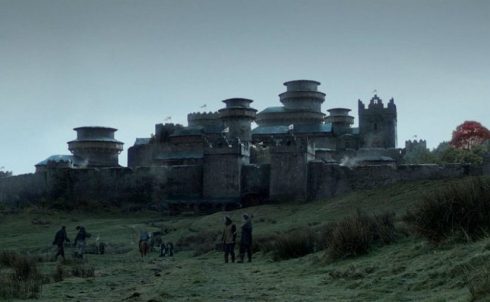
You have 8,000 years of recorded history, do you?
Part of this is just the trappings of the genre. We expect Elves in fantasy stories to fight with bows instead of gauss rifles. And it’s much more dramatic to have Gandalf riding into Helm’s Deep astride Shadowfax than on Kaneda’s motorcycle. (And before anyone brings ups Warhammer, Shadowrun, or the like, we’re talking high fantasy here.)
But there’s another answer to this question, and one that sits in plain sight: Magic. Arthur C. Clarke famously said that “Any sufficiently advanced technology is indistinguishable from magic.” Great as that quote is, I don’t entirely agree. It might appear on the surface that magic and technology are the same literary trope, just repackaged to fit their respective genres. Certainly they do fulfill a similar function. They both allow characters to do extraordinary things that we can’t do in our world, and both serve to create magical MacGuffins, whether it’s the One Ring or the Genesis device.

Still one of my favorites after all this time.
Both are methods of achieving some of the same things, but the two are not the same. Technology is derived through science and observation of nature, whereas magic (as it is defined by fantasy) is supernatural. It’s a fine distinction, but one that manifests itself on society in very different ways when you run the permutations. Here are a few examples and thought experiments for you. For our purposes, wizardly magic and divine/priestly magic are lumped together.
1.) Health and Well-Being
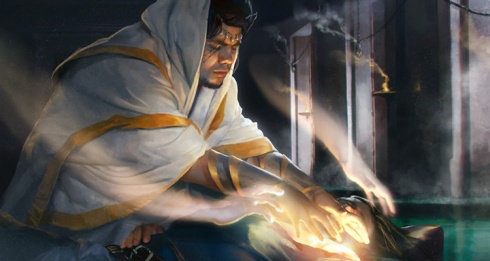
“Close one this time, Olaf. Be more careful tomorrow, yeah?”
A medieval society with magic will fare better (in the short term) than a medieval society without it. Duh, right? But the presence of magic potentially has an immediate, positive effect on the population. Let’s say that you have a small group of practitioners of magic in your kingdom who can heal wounds and/or cure any disease. Your population will immediately have an advantage over its muggle counterpart. If the bubonic plague strikes your realm, you have an instant answer to it. Not only could your healers eventually eradicate the disease completely (depending on how often they can perform this miraculous feat), but they could presumably cure themselves if contact with the plague victims means they contract the disease themselves. An outbreak that might annihilate a real medieval kingdom might be downgraded to more of an inconvenience if those resources are brought to bear early enough.
If you can magically heal wounds, that means that a farmer accidentally cutting himself on an old plow, or a soldier cut by a rusty blade might make a full recovery, where they might die of tetanus otherwise. Infant mortality would likewise go down, along with the instances of mothers dying in childbirth. If you can lay on hands or just a drink a magic potion to mitigate, or even reverse, bodily ailments and harm, you have just leaped well beyond the scope of the grim realities of the real 12th century. In fact, with that alone, your ability to see to the health and well-being of your people is far beyond what we have in real life today, or likely to have for many centuries to come.

“Honey, I’m stopping by the apothecary on the way home. We need anything?”
Consequently, your kingdom’s military could expect to lose fewer people in armed conflict as those who might die of mortals wounds might be spared and in time make a full recovery. Soldiers might then be willing to take more risks in battle that only the most fanatical or stalwart would in real life.
All these factors would mean that your kingdom would potentially have a larger population than its historical equivalent, with fewer lost to disease and war, and your people would likely be more healthy on the whole. Even small amounts of magical healing opens that up for you. The more healers you have, and the more robust their ability to perform their magic, the greater these advantages are realized.
2.) Stunted Development
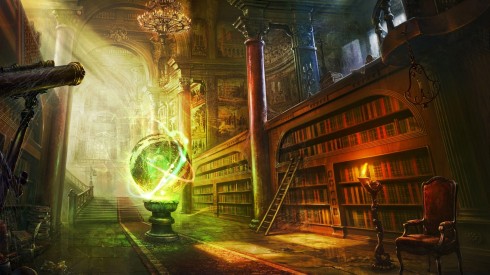
Even if it won’t lead to splitting the atom, I still want it.
You don’t learn as much when you can wave a magic wand to fix a problem. That’s the downside to magic. In most interpretations of magic in fiction, the practitioner may not know how to fix the problem without magic’s intercession. The caster may need to know a lot about the powers they are channeling, maybe the alignment of the planets or ley lines, but the answer to the problem is not always required to fix what’s wrong.
Let’s take our example above and look a little closer. If you can perform a ritual and Poof! an ailment goes away, you don’t necessarily need to develop the germ theory of disease, or realize that you need to wash your hands before treating a wound. You probably wouldn’t need to learn much about surgery, either, or anesthetic. If you can purify water with a wave of your hand, you don’t have to learn about proper filtration methods or bacterial water testing. And if you can cast a spell and take flight like a bird, or simply teleport to a destination, why would you go through all the trouble of designing and building an airplane?
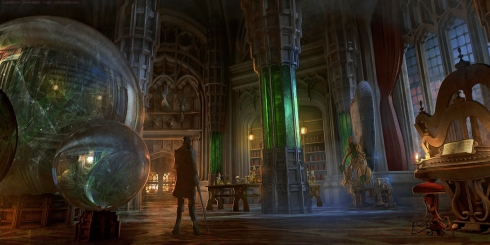
This one, too.
This is the trade-off with magic—you don’t necessarily have to learn about a problem or its root causes to solve it. In so doing, you greatly hinder your ability to increase your understanding of the world around you, as many of the stresses that force a society to advance are alleviated or eliminated altogether.
This stunted development is further fueled by the lack of people who can wield this problem-solving power. Rarely in fantasy are wizards or empowered priests as common as cobblers or farmers. No, wielders of magic are usually rare, and take years of study and devotion to achieve any mastery of power. Unless they imbue this power into objects, such as magic swords or invisibility rings that a layperson can use, the utility of this power will forever remain in the hands of a few, and rarely achieve any widespread usage. So, there might be an answer for many of society’s ills, but only as far as the wielders or rulers directing its power will allow.
3.) Warfare
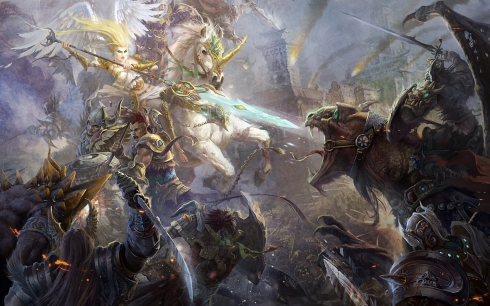
“Eat glowing crystal, foul beast!”
War adapts (eventually). Armed conflict is just as prevalent in fantasy worlds and stories as it was in the actual 12th century. When you add any level of magic to the mix, however, the people actually waging the war will have to change how they go about it.
Let’s say that magic on the battlefield is restricted to just magical weapons and armor. That still means that tactics would have to change if one side finds itself the have-nots in this situation. Perhaps surprise attacks become the norm to catch such magic-clad soldiers unaware, rendering their advantages null. Or perhaps feints and subterfuge have to be employed to trick empowered forces out of position, so that their magical advantage can’t be utilized at the point of conflict.
Now, let’s open it up a bit more and say that there are battlemages that can summon flame without flint or tinder. Tims, we’ll call them (for purely fanboy reasons). If a Tim can point a finger at a formation of pikemen or line of charging cavalry and reduce them to ash with a few spoken words, no one would assemble forces like that.
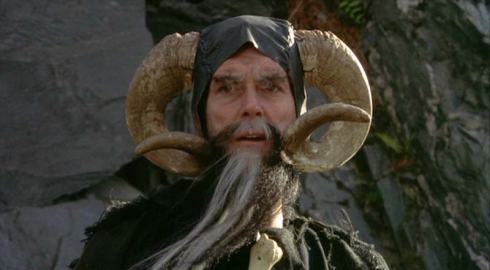
“You know my name.”
Let’s remember just how incredibly expensive it is for a medieval lord to field an army. You need to equip them with weapons and armor, train them, and keep them fed and maintained, along with any number of horses and support animals. Even if individual knights are expected to pay their own way, whole campaigns have been abandoned because the leading lord’s coffers ran dry. And when you think of how much coin and effort it takes to bring a medieval army to the battlefield, no lord who isn’t crazy or desperate would be willing to put his troops in a nice, neat ‘fireball formation.’ A single Tim radically changes the calculus of war.
Even if both sides have a Tim of their own, that wizard had better watch his back. Almost certainly, there would be assassins sent after him on the eve of any conflict since his presence, or lack thereof, would prove decisive. Lords might choose to settle their differences with smaller scale engagements, or dueling champions, perhaps even a one-on-one bout between the Tims in question. The point being that once you start flinging spells in war, war itself changes.
Conclusions:

Breathtaking.
Let’s circle back to the question I raised at the beginning of this post. Why do fantasy societies eternally exist in the Middle Ages, or something similar? Why don’t we have Elven airplanes or Dwarven tanks? Besides the author just wishing it to remain that way, it’s my belief that magic is the chief reason. It accomplishes many of the same things as science and technology, and does so without industrialization, but the solutions it gives you are hollow and less accessible. Fantasy peasants will almost never enjoy the fruits of magic the way you and I can flip on a light switch, or turn on a heater.
And the advantages of magic are ultimately off-set by how it undermines learning and advancement. Society will rarely continue to look for an answer once it has found one. If a court wizard can reliably use magic to send messages to far off lands or holdings, there’s not much pressure to invent the telephone.
Ultimately, how different a fantasy society varies from its historical counterpart will depend on how magic is defined and how well all the interrelationships are maintained. The best fantasy stories and worlds are those that really seek to understand what it means to inject the power of magic into a Middle Ages-esque society, and reflect that in the story.
So that will just about wrap it up here, folks. If you have any thoughts on this topic, feel free to leave them in comments section. I may revisit this topic every once in a while, since even a long post can barely scratch the surface of the subject.
Thanks for reading!


